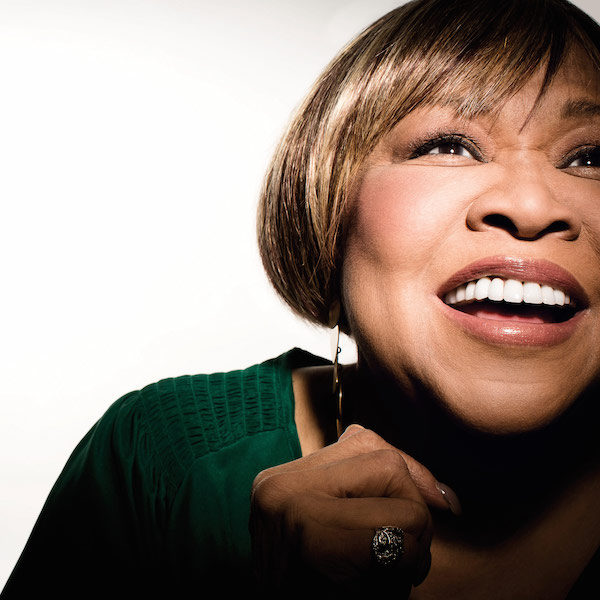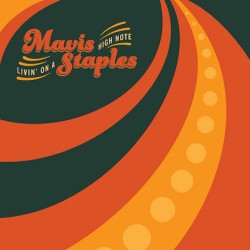Music Feature: At 76, Singer Mavis Staples Continues to be an Antidote to Despair
Mavis Staples’ voice and stage presence still exude power, still plumb emotional and spiritual depths.

Singer Mavis Staples — a HBO documentary on her life debuts on February 29. Photo: HBO.
By Robert Israel
Flashback:
As a teenager without car or driver’s license who grew up in the late 1960s, I traveled to Newport, Rhode Island’s summer music festivals via ferryboat from Providence’s India Point. Newport was the nexus for folk singers and gospel groups. Unlike today where security barriers keep audiences at a distance from performers, Festival Field during this era was the opposite: audiences mingled with the artists at informal “hoots” and workshops or invited to clamber onstage to sing along. You’d see the likes of Joan Baez, Pete Seeger, Judy Collins, Bob Dylan, Theo Bikel, and many others, singing together or alone, swapping songs, performing duets, all while rapt audience members sat clustered at their feet.
On Sunday mornings, gospel music groups – many of them had traveled by bus to Newport from the Deep South – performed on the lawn. They sang without microphones: they never seemed to need them. If they were weary from their road trips, they never showed it: their rhapsodic voices, as if drenched in butterscotch and sorghum syrup, rose up above the sun-splashed field and became pure light.
It was on a Sunday morning in 1967 — my blanket spread out alongside a wooden performance platform – that I heard, for the first time, the glorious harmonies of the Dixie Hummingbirds from South Carolina. One of the groups that followed the Hummingbirds — with Mississippi roots (by way of Chicago) — was the Staple Singers.
The Staples family — “Pops” Staples and daughters Pervis, Mavis and Cleotha — had already gained notoriety singing at civil rights rallies with Rev. Dr. Martin Luther King, Jr., “preaching” the gospel about the evils of segregation and rousing listeners through exhilarating song to unite in solidarity for the purpose of creating a more just, more inclusive society. They had a commanding presence. When they sang, it was a personal invitation to foreswear the toils of daily life and to claim a righteous place in the Kingdom on High.
Flash forward:

Now 76 years old, Mavis Staples shows no signs of slowing down as she reaches out to new audiences. She alone carries on her family’s musical tradition, after the deaths of her father “Pops” and her sister, Cleotha. (Pervis Staples retired years before). In 2015 and throughout 2016, she’s booked for weekly shows at venues around the country. Late last year, I saw her perform in Boston at a Celebrity Series concert before a capacity crowd at Berklee Performance Center; her voice and stage presence continue to exude power, to plumb emotional and spiritual depths.
A couple of weeks ago, she joined fellow septuagenarian Joan Baez on stage at the Beacon Theatre in New York City for Joan’s 75th birthday, singing alongside Paul Simon, Judy Collins, Jackson Browne, and others.
Her touring schedule would exhaust younger performing artists. These upcoming appearances include performing in New Orleans at the Jazz and Heritage Festival in May and at Bonaroo in Tennessee in June.
A new HBO documentary about her life, Mavis!, will screen on February 29. A sneak preview is now available on her website.
An EP, entitled “Your Good Forture,” release by the Anti- label two months ago showed, that her songs have not lost their relevance. As fellow-performing artist Joan Osborne, who joined her onstage in Boston at the Berklee, put it, “Mavis transports you to the very foundation of your soul.”
For those not familiar with Mavis and the Staples Singers, a good place to start is with the Staples’ cameo appearance in the movie The Last Waltz (Martin Scorsese’s film about rock group The Band’s last concert). Mavis stands out by being the most demonstrative and outspoken. In an interview some years back about the making of that film, she explained why she became so animated, appearing on the screen clapping her hands and intoning a deep emotional response to the song she was singing:
I have a tendency, which I think is good, to just sing from my heart. I want to feel it myself. Pops taught me that, to sing from my heart. I can’t just sing from the top of my head. I gotta get into the song. I see it like a movie, in my head… I don’t want to be gloatin’, you know, but anytime I watch it, it’s refreshing. It’s like the first time. You never get tired of it, you know. And I remember everything about it. I remember every moment that we had doing that. Pops said, ‘Mavis! Baby, you shouldn’t carry it out so long like that,’ when I go, ‘Heeeyyyy yeeeeaaah.’ And I said, ‘Nah, daddy, that’s the good part. That’s what I feel.’ He said, ‘O.K., do what you feel. That’s the best thing. Do what you feel.’
Mavis Staples is on a mission; she wants to serve as an antidote to despair and hatred, to set off “positive vibrations.” In these times of murderous strife and political demagoguery, each day generating new proclamations of vulgarity and racism, Mavis’ takes up the challenging task of providing healing. Like the songs she and her family sang long ago in Newport, they are about bringing flickers illumination into what seems to be a darkening world.
Robert Israel writes about theater, travel, and the arts, and is a member of Independent Reviewers of New England (IRNE). He can be reached at risrael_97@yahoo.com.
